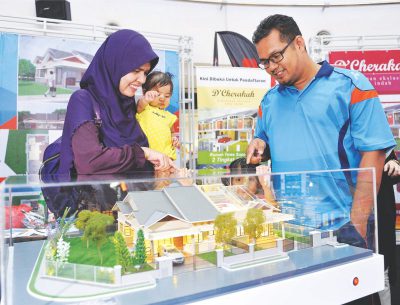‘Make more babies’ call does not make sense’
A lawmaker has taken issue with a property consulting firm’s suggestion that a higher population growth is needed to resolve the property overhang in the country. Last month, Rahim & Co International Sdn Bhd director of research and strategic planning Sulaiman Saheh said Malaysia needs a higher population growth to commensurate housing supply growth. Nik Nazmi Nik Ahmad said the demand and supply mismatch in the residential property market is not caused by the people. “The problem of a ‘mismatch’ in the residential property market came from the developers and authorities; it is not an issue caused by the people,” he said. Nik Nazmi said the residential property overhang can be resolved if Malaysians’ purchasing power is higher. (The Edge)
Malaysia ranks second in Southeast Asia for trade and connectivity
Malaysia has maintained its strong position globally, ranking second highest in Southeast Asia and 12th out of 169 countries for trade connectivity, according to the DHL Global Connectedness Index (GCI) report. The fifth edition of the GCI, which measures international flows of trade, capital, information and people, stated that Malaysia also improved the depth and breadth of its global connectedness to 15th and 28th places in the world respectively. The GCI report said Southeast Asian countries benefit from linkages with the wider Asian supply chain networks as well as ASEAN policy initiatives promoting economic integration. Malaysia and three other Southeast Asian countries – Cambodia, Singapore and Vietnam – were economies where international flows exceeded expectations the most. (NST Online)
Five new hospitals for Selangor
The Selangor state government, through Selangor State Development Corporation’s (PKNS) wholly-owned subsidiary, Selgate Corporation, plans to build five hospitals in five years to address the issue of “lack of beds”, which is a term commonly used for lack of hospitalisation space and the reason patients experience long waiting times. The new hospitals will target patients from the medium-income group who are from the M40 category, while the B40 group will be able to access these facilities through state programmes. The first phase of the 2.58ha Selgate Rawang Hospital at Persiaran Anggun in Sungai Bakau is expected to be completed in December. The Rawang hospital, which is the first of the five planned, is scheduled to start operations next year, and fully completed by 2023. “The four other hospitals will be built in urban and suburban areas, namely Kota Damansara, Shah Alam, Gombak and Kuala Selangor. The funds to build the hospitals would be through joint ventures and also projects financed by Selgate. (The Star Online)

Artist’s impression of Selgate Rawang Hospital being built at Persiaran Anggun in Sungai Bakau. (Image from The Star)
Malaysia willing to consider second Samurai bond issue: Guan Eng
Malaysia is willing to consider issuing another Samurai bond if it can obtain rates similar to the 0.63% per annum achieved in the earlier issuance of ¥200 billion (RM7.3 billion) last week, says Finance Minister Lim Guan Eng. Lim said strong interest from Japanese investors had enabled the samurai bond to be competitively priced. “This is a testament to confidence of Japanese investors in the Malaysian economy and the government’s fiscal reforms,” he said. “The proceeds (from the Samurai bond issuance) will be used to finance infrastructure development and not for debt repayment. This will free up the government revenue sources that can be used to pay its debts,” he added. (The Sun Daily)
Negeri Sembilan State Govt, REHDA to address housing issues
The State Government will continue to work with the Real Estate and Housing Developers’ Association (REHDA) to address the issue of people who cannot afford to own houses. State Urban Wellbeing, Housing, Local Government and New Villages Committee chairman Teo Kok Seong said the state government was not in competition with housing developers. “This is because we want to ensure that the developers will include affordable units in their housing projects,” he said, noting that the developers would also want to keep their costs low at the same time. The HOC would not be the only measure by the state government to create a close cooperation with housing developers; there would be more state policies drafted in the future that were friendly to housing developers. (The Edge)





